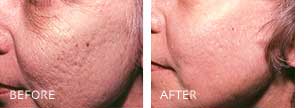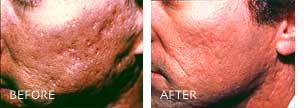Acne Scars
Acne is the most common skin concern in the United States. Treating acne can be a long and painful road, leaving many patients with physical reminders of long-term redness, infection, cyst and pustule eruption, and inflammation. With the help of a board-certified dermatologist, acne can be treated and eliminated; with routine upkeep, acne resurgence can be controlled and prevented. However, even with the best interventions, acne scars can and do happen, leaving behind an unsightly reminder of the pain and discomfort of long-term acne.
With the help of a board-certified dermatologic surgeon, both acne and acne scars can be reduced.
Why Choose the Laser and Skin Surgery Center of Indiana for Reduction of Acne Scars?
While many acne scars can be treated using non-surgical treatments, you may benefit from minimally invasive surgical procedures. By choosing the Laser and Skin Surgery Center of Indiana (LASS), you ensure that you’re working with a board-certified dermatologic surgeon who can manage every part of your treatment. Furthermore, our team of dermatology providers offers wide-ranging expertise in skin health, acne, and scars, with all providers being supervised by Dr. C. William Hanke, a board-certified dermatologist.
The LASSI is also home to an accredited clinical research trials facility, testing new technologies and medications to treat all kinds of medical and cosmetic skin conditions. Many of the procedures that dermatologists and other skin care experts trust were first tested right under our roof, making us some of the most experienced and knowledgeable providers you’ll find in Indiana.
Do You Have Acne Scars?
Facial scarring, whether caused by acne or other skin conditions, all have treatment options to reduce their appearance. However, before we can treat your acne scars, we must first evaluate them to determine the best treatments.
Skin Evaluation
During your initial consultation at the Laser and Skin Surgery Center of Indiana (LASSI), we will evaluate your skin damage to determine what kind of scars you have, the extent of the damage, and check for signs of active infections. This information, coupled with a full medical history, gives us the information we need to recommend the right procedures for your unique needs.
Solutions for Acne Scars in Indianapolis at the LASSI
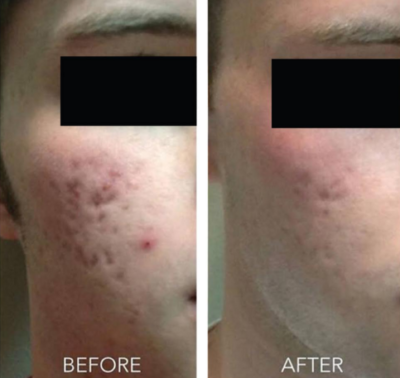
Once we have evaluated your skin condition and health and the extent of your acne scars, we will recommend one or more of the following procedures available in our Indianapolis dermatology practice:
Microneedling
Using very fine needles, we are able to penetrate and break up the scar tissue while stimulating natural collagen production beneath the skin. The body’s natural healing processes are triggered, providing a reduction in visible scarring after a series of treatments. Microneedling is best for more superficial scars or after more intense procedures are administered.
Dermabrasion
Dermabrasion, not to be confused with microdermabrasion, is a method of flattening skin surface irregularities by abrading the skin with a rotary instrument. Prior to treatment, the skin is numbed with a local anesthetic. The high-speed rotary instrument is precise enough to remove only the desired amount of skin. Treatment time and aftercare are similar to laser resurfacing, and should only be administered by a board-certified dermatologist, dermatologic surgeon or cosmetic surgeon.
Dermabrasion is ideal for acne scar repair as it allows the physician to precisely target only scar tissue for treatment. It’s also intense enough that it requires fewer treatments for it to effectively reduce the appearance of acne scars.
Subcision
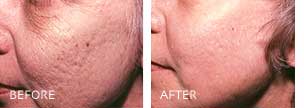
Subcision is an undermining technique that is utilized to elevate very deep, depressed acne scars. A dermatologist will administer a local anesthetic. Once the patient is numb and comfortable, he will then insert a fine gauge needle underneath each acne scar individually. He will then use the needle to break up the scar tissue, releasing the thick scar bands and allowing the depressed acne scar to elevate for a smoother surface. After repeated treatments, the depth of the acne scar will decrease over time.
Subcision is ideal for depressed scars, sometimes called “ice pick” scars. Sometimes, these subcision treatments are complemented with injectable dermal fillers that will help raise the area temporarily for a smooth, even skin surface.
After subcision, laser skin resurfacing is often recommended to finish smoothing the skin’s surface and stimulate healing collagen production.
Punch Replacement Grafts
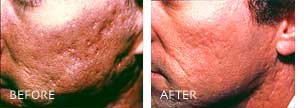
In addition to subcision, ice pick-type scars can also be treated using a small biopsy punch. After administering anesthesia, your board-certified dermatologic surgeon will remove the scar and replace it with a graft from behind your ear or by closing the opening with a suture. He will then apply a narrow piece of tape to the punch replacement graft to hold it in place for four days. Sometimes laser skin resurfacing or dermabrasion is required several months later to flatten the tiny grafts and stimulate collagen production.
Laser Skin Resurfacing
Laser skin resurfacing removes damaged surface skin, speeding up skin cell turnover, youthful collagen production, and brand-new, smooth skin. We offer both ablative laser resurfacing and fractional laser resurfacing in our Indianapolis dermatology practice. Our providers will recommend the right laser treatment for your needs and goals.
Get Started and Treat Your Acne Scars at the LASSI
Stop living with the physical reminders of acne’s past. Schedule a consultation with Dr. C.W. Hanke at the Laser and Skin Surgery Center of Indiana and start reducing the appearance of acne scars today. We look forward to helping you look and feel your best during every stage of life using only FDA-cleared, proven techniques, technologies, and treatments.



